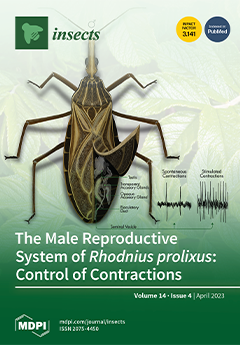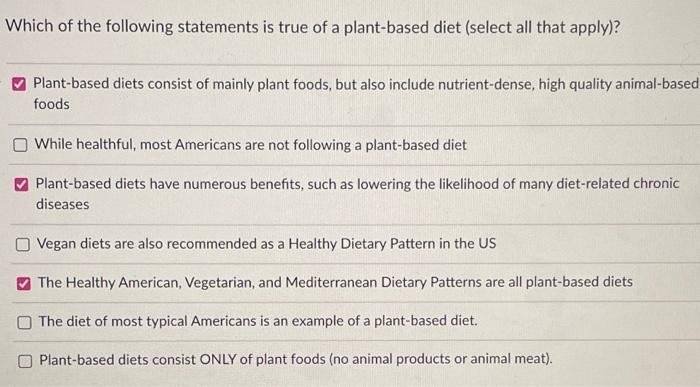Which Statements are True Concerning Plant-Based Diets? Plant-based diets offer numerous health benefits and can reduce the risk of chronic diseases. They emphasize whole foods like fruits, vegetables, grains, and legumes.
Plant-based diets have gained significant popularity due to their health benefits and environmental impact. People adopting these diets often experience improved heart health and better weight management. These diets are rich in essential nutrients and fiber, which support overall well-being.
Plant-based eating also contributes to sustainability by reducing the carbon footprint. Popular choices within plant-based diets include vegan and vegetarian options, as well as flexitarian approaches. Transitioning to a plant-based diet can be simple and rewarding, offering both personal health advantages and benefits for the planet. This dietary shift promotes longevity and a healthier lifestyle.
Health Benefits
Plant-based diets offer numerous health benefits. These diets focus on foods from plants. They include vegetables, fruits, nuts, seeds, oils, whole grains, legumes, and beans. People who follow plant-based diets often experience better health outcomes.
Nutrient-rich Foods
Plant-based diets are rich in nutrients. They provide essential vitamins and minerals. These diets are high in fiber, antioxidants, and phytochemicals. Such nutrients help in fighting diseases. They also boost the immune system.
- Vitamins: Vitamins A, C, E, and K are abundant.
- Minerals: Iron, magnesium, and potassium are present.
- Fiber: Helps in digestion and maintaining a healthy gut.
- Antioxidants: Protect the body from free radicals.
Heart Health
Plant-based diets are good for the heart. They can lower blood pressure. They also reduce the risk of heart disease. These diets are low in saturated fats. They do not contain cholesterol.
| Food | Benefit |
|---|---|
| Leafy Greens | Rich in nitrates, lowering blood pressure. |
| Nuts and Seeds | Contain healthy fats improving heart health. |
| Whole Grains | Reduce bad cholesterol levels. |
Weight Management
Plant-based diets help in managing weight. They are low in calories but high in nutrients. Eating plant-based foods can make you feel full longer. This reduces the urge to snack on unhealthy foods.
- High Fiber Content: Keeps you full longer.
- Low Caloric Density: Fewer calories per gram of food.
- Nutrient-Dense Foods: Provide essential nutrients without excess calories.
People who follow plant-based diets often have a lower body mass index (BMI). They are less likely to become overweight or obese.

Credit: www.goodreads.com
Environmental Impact
Plant-based diets are gaining popularity for their positive impact on the environment. These diets help reduce pollution, conserve water, and decrease greenhouse gas emissions. Let’s explore some specific environmental benefits of plant-based diets.
Reduced Carbon Footprint
Adopting a plant-based diet significantly lowers your carbon footprint. Animal farming produces a large amount of carbon dioxide. Plant-based foods, like vegetables and grains, produce less CO2. This helps fight climate change effectively.
Consider these points:
- Livestock farming produces methane, a potent greenhouse gas.
- Growing plants absorbs CO2 from the atmosphere.
- Transporting plant-based foods requires less energy.
Water Conservation
Switching to a plant-based diet also helps in water conservation. Animal farming uses a lot of water. Growing plants generally requires less water. This helps save precious water resources.
Here’s a quick comparison:
| Food Item | Water Usage (liters per kg) |
|---|---|
| Beef | 15,000 |
| Vegetables | 322 |
| Grains | 1,644 |
By choosing plant-based foods, you help save water. This is crucial for maintaining a sustainable environment.
Common Myths
Plant-based diets often face misconceptions. People worry about protein deficiency and limited food choices. Let’s debunk these common myths.
Protein Deficiency
Many think plant-based diets lack protein. This is not true. There are many plant sources of protein.
- Legumes: Beans, lentils, and peas are protein-rich.
- Whole grains: Quinoa, oats, and barley provide protein.
- Nuts and seeds: Almonds, chia seeds, and hemp seeds are great options.
- Vegetables: Broccoli, spinach, and kale have surprising protein amounts.
Protein deficiency is rare with a balanced plant-based diet.
Limited Food Choices
Some believe plant-based diets limit food choices. This is also a myth. There are diverse and tasty options.
| Category | Examples |
|---|---|
| Fruits | Apples, bananas, berries |
| Vegetables | Carrots, sweet potatoes, peppers |
| Grains | Rice, quinoa, couscous |
| Protein sources | Tofu, tempeh, seitan |
Plant-based diets offer a wide variety of foods. They are not restrictive.

Credit: www.mdpi.com
Nutritional Considerations
Understanding the nutritional considerations is crucial for a successful plant-based diet. This includes ensuring you get all the essential vitamins and minerals. It also involves planning balanced meals for overall health.
Essential Vitamins
Plant-based diets can sometimes lack certain essential vitamins. Below are key vitamins to focus on:
- Vitamin B12: Found in fortified foods or supplements.
- Vitamin D: Sunlight exposure and fortified plant milks.
- Iron: Lentils, chickpeas, and spinach are good sources.
- Omega-3 Fatty Acids: Found in flaxseeds and chia seeds.
Ensuring an intake of these vitamins prevents deficiencies. It keeps your body functioning optimally.
Balanced Meals
A balanced plant-based meal includes a variety of food groups. Here’s a simple way to plan your meals:
| Food Group | Examples | Benefits |
|---|---|---|
| Proteins | Beans, tofu, tempeh | Builds muscles and repairs tissues |
| Carbohydrates | Whole grains, sweet potatoes | Provides energy |
| Fats | Avocado, nuts, seeds | Supports brain health |
| Fruits and Vegetables | Berries, leafy greens | Rich in vitamins and minerals |
Combining these food groups ensures a balanced intake of nutrients. Aim for variety to keep meals interesting and nutritious.
Variety In Plant-based Diets
Plant-based diets offer a wide range of options. Each diet has unique characteristics and benefits. Understanding these variations helps in making informed dietary choices.
Vegan Vs. Vegetarian
Vegan and vegetarian diets are both plant-based. Vegans avoid all animal products. This includes meat, dairy, and eggs.
In contrast, vegetarians may consume dairy and eggs. Both diets focus on fruits, vegetables, grains, and legumes.
| Diet Type | Includes | Excludes |
|---|---|---|
| Vegan | Fruits, vegetables, grains, legumes | Meat, dairy, eggs, honey |
| Vegetarian | Fruits, vegetables, grains, legumes, dairy, eggs | Meat |
Incorporating Whole Foods
Whole foods are an essential part of plant-based diets. They offer numerous health benefits. These foods are minimally processed and nutrient-dense.
- Fruits: Apples, berries, oranges
- Vegetables: Spinach, kale, carrots
- Grains: Brown rice, quinoa, oats
- Legumes: Lentils, chickpeas, black beans
- Nuts and Seeds: Almonds, chia seeds, flaxseeds
Incorporating these foods into your diet can improve health. They provide essential vitamins, minerals, and fiber. Eating a variety of whole foods ensures balanced nutrition.

Credit: www.amazon.com
Economic Factors
Plant-based diets offer numerous health and environmental benefits. Economic factors also play a crucial role in adopting this lifestyle. Understanding the cost of ingredients and exploring budget-friendly options can make a plant-based diet accessible to everyone.
Cost Of Ingredients
The cost of ingredients in a plant-based diet can vary widely. Fresh fruits, vegetables, grains, and legumes are generally affordable. Specialty items like organic produce or meat substitutes can be more expensive. Below is a table comparing average prices of common plant-based foods:
| Ingredient | Average Price (per pound) |
|---|---|
| Lentils | $1.39 |
| Brown Rice | $1.00 |
| Broccoli | $1.80 |
| Tofu | $2.00 |
| Organic Tempeh | $3.50 |
As you can see, many basic plant-based ingredients are quite affordable. Choosing these over expensive meat and dairy can save money.
Budget-friendly Options
Eating plant-based doesn’t have to break the bank. There are several budget-friendly options available:
- Buy in bulk: Items like beans, grains, and nuts are cheaper in bulk.
- Seasonal produce: Choose fruits and vegetables that are in season.
- Frozen vegetables: These are often cheaper and just as nutritious.
- Local farmers’ markets: They can offer lower prices for fresh produce.
These strategies can help reduce the overall cost of a plant-based diet. They make it more accessible for those on a budget.
Transition Tips
Transitioning to a plant-based diet can feel overwhelming at first. But with the right tips, it becomes easier and enjoyable. Here are some practical tips to help you make the switch smoothly.
Gradual Changes
Start with small, gradual changes to your diet. This way, your body and taste buds can adjust over time.
- Begin by replacing one meal a day with a plant-based option.
- Increase your intake of fruits and vegetables each week.
- Try meatless Mondays to get into the habit.
Consider making a weekly plan to track your progress. This can keep you motivated and organized.
Simple Recipes
Learning to cook simple recipes can make the transition smoother. Start with easy-to-make dishes that require minimal ingredients.
| Meal | Recipe |
|---|---|
| Breakfast | Oatmeal with fruits |
| Lunch | Quinoa salad with veggies |
| Dinner | Stir-fried tofu with broccoli |
Using simple recipes helps you stay committed and reduces stress. You can find many delicious and easy recipes online.
Celebrity Endorsements
Celebrity endorsements have significantly influenced the popularity of plant-based diets. Famous personalities advocate for these diets, highlighting their benefits. These endorsements have a ripple effect, encouraging the public to consider plant-based options.
Famous Advocates
Many celebrities have embraced plant-based diets. They share their experiences and reasons for choosing this lifestyle. Some well-known advocates include:
- Beyoncé: Promotes veganism for health and fitness.
- Joaquin Phoenix: Speaks about animal rights and environmental impact.
- Arnold Schwarzenegger: Supports plant-based diets for muscle building.
- Billie Eilish: Encourages a vegan lifestyle for ethical reasons.
Public Influence
Celebrity endorsements play a crucial role in shaping public opinion. When a famous person endorses a plant-based diet, it grabs attention. This often leads to increased curiosity and adoption of such diets. These endorsements can influence people in various ways:
- Increased Awareness: People learn about the benefits of plant-based diets.
- Health Trends: Celebrities sharing their health improvements inspire others.
- Ethical Considerations: Endorsements highlight animal rights issues.
- Environmental Impact: Promotes the ecological benefits of plant-based eating.
| Celebrity | Reason for Endorsement |
|---|---|
| Beyoncé | Health and Fitness |
| Joaquin Phoenix | Animal Rights |
| Arnold Schwarzenegger | Muscle Building |
| Billie Eilish | Ethical Reasons |
Frequently Asked Questions about Which Statements are True Concerning Plant-Based Diets?
What Is A Plant-based Diet?
- A plant-based diet focuses on foods primarily from plants. This includes not only fruits and vegetables, but also nuts, seeds, oils, whole grains, legumes, and beans.
Are Plant-based Diets Healthy?
- Yes, plant-based diets can be very healthy. They are rich in nutrients, fiber, and antioxidants, which can reduce the risk of chronic diseases.
Can Plant-based Diets Provide Enough Protein?
- Absolutely, plant-based diets can provide sufficient protein. Foods like lentils, chickpeas, tofu, and quinoa are excellent protein sources.
Do Plant-based Diets Help In Weight Loss?
- Yes, plant-based diets can aid in weight loss. They are typically lower in calories and high in fiber, which promotes fullness.
Conclusion
Plant-based diets offer numerous health benefits and environmental advantages. They are rich in nutrients and can reduce chronic disease risk. This type of diet promotes a sustainable lifestyle and supports animal welfare. Embracing plant-based eating can lead to a healthier, more compassionate, and eco-friendly way of living.


















